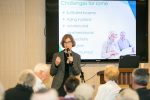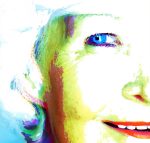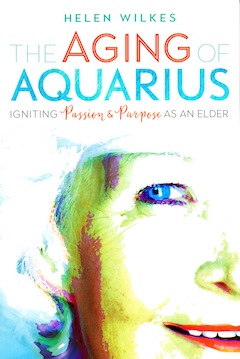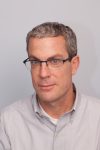My family recently traveled to northern Virginia for a bar mitzvah. We did it in a long weekend. We left Thursday afternoon and returned on Tuesday. It was the farthest we’ve ever gone in a weekend with kids. Afterward, I felt bleary and fuzzy around the edges. However, wandering through three airports in each direction and attending five or six big family events and meals exposes you to things you might not have noticed before.
My nephew became a bar mitzvah at my childhood congregation. Each weekend, they print a bulletin or program with information about services and upcoming activities. When services ended, my husband tucked his program into his tallis bag as a memento. I also took one for safekeeping, but I saw it as primary source material. Proof that, indeed, all these activities could happen at a healthy congregation.
Awhile back, I wrote a column describing a slate of weekend Jewish events, for every age group, at North American congregations. As one template, I used Temple Rodef Shalom, in Falls Church, Va. I’ll never forget some of the feedback I got. The loudest responses were from older men. One told me I must be making this up. Why would any congregation cater to special interests (children, teenagers, those with disabilities, women, Jews of colour, the needy, Jews by choice, and others) the way these ones did? This man stopped just shy of telling me I was writing fake news.
I don’t consider myself a journalist. I wasn’t trained as one. I usually write clearly marked opinion pieces, how-to articles and features. I don’t go to war zones, report on famine or natural disasters, but, apparently, that didn’t matter either. In a reply, I linked to two congregations’ calendars, including ones that had served as my template. The somewhat virulent response from this man targeted Reform Judaism, liberals and … no need to go on, you get the picture. No amount of valid information would likely sway him.
While going through the Winnipeg, Minneapolis and Washington National airports, I glimpsed newsstand magazine covers. Time magazine’s Person of the Year was not Trump. No, the 2018 people of the year were journalists killed or imprisoned for doing their job.
Journalists and, more generally, writers, have a job that requires them to observe, hear and listen to what’s going on around them. In a fast-moving world, a well-written piece can help readers absorb information or perceive a different point of view – ideally to help us understand a bigger worldview than we can find on our own.
I thought about this “fake news” response while I read the synagogue bulletin from the bar mitzvah. The congregation’s name, chosen in the 1960s – Rodef Shalom, Pursuer of Peace, referencing Psalm 34:15 – was carefully selected: “Depart from evil and do good. Seek peace and pursue it.” And, indeed, the congregation was doing many good activities in December. They examined issues concerning gun violence, Torah, politics and the life of the synagogue. On Dec. 25, they had a Mitzvah Day scheduled, working on creating “care kits” for the homeless, cooking and delivering hot meals and sandwiches to homeless shelters, and collecting, sorting and distributing winter clothing for those who needed it.
There are many Jewish angles to being a good journalist, writer or observer. Jews are People of the Book. We’re also primed, in the Sh’ma, to “hear these words, to speak them, to write them and to teach and listen to them.” In our efforts to understand who we are as Jews, we also must learn to hear, listen and communicate with others. We should know what it means to be a witness to events, whether we are journalists or not.
If one wants to, you can really shelter yourself these days into consuming (watching, hearing and reading) just the “feed” that caters to your sensibilities. That is, you can believe there is a border wall already being built between the United States and Mexico to keep out dangerous criminals instead of refugees. You can provide yourself a fake news narrative that somehow allows you to think that the white person who shot at synagogue-goers in Pittsburgh, or the one who killed so many in Las Vegas, is not as threatening as Al Sharpton or American Muslims.
I choose a different approach. In the airport, we smiled at others – no matter their skin colour or religious beliefs. We chatted with a young woman who attends Howard University (an historic and respected African-American institution) and I told her how great the campus was when I once took a teacher licensing exam there. One of my kids pulled a book out of a backpack for me to read them while we waited: a Scholastic book on Viola Desmond (who’s on Canada’s new $10 bill, by the way).
Time said they chose these journalists “for taking great risks in pursuit of greater truths, for the imperfect but essential quest for facts, for speaking up and for speaking out.”
Part of being Jewish is taking the time to hear and listen to what is around us, and to take risks to pursue truth and peace. We’re known as people who speak out for those who need compassion (Joseph helped the Jews in Egypt in time of famine) and justice (Moses spoke out against slavery). In that tradition, we have had modern leaders like Abraham Joshua Heschel, who spoke out on civil rights.
I take this one step further when I write it down and it gets sent to you in the newspaper. We’re lucky – as we start 2019, we have the power to choose to read, listen, learn and treat each other with love and an open heart and discern what is real. I have an actual printed bulletin to prove that synagogues can and do provide programming for many constituencies. I do fear hatred, lies, violence and fake news, but I don’t spread a blanket of fear where it doesn’t belong – not on top of people of colour (Jews or non-Jews) or others with predominantly moderate religious traditions like Islam.
Christians may talk about witnessing but, every day, Jews recite in the Sh’ma an obligation to hear and to listen, to read and communicate our values. When we truly pursue peace, we don’t accuse each other of making up the news. Instead, we make news for doing good things and being upright and honest with one another.
Let’s lift a glass to tolerance and good communication, too. Here’s to a loving, peaceful, civil and truthful 2019. L’chaim.
Joanne Seiff has written regularly for CBC Manitoba and various Jewish publications. She is the author of three books, including From the Outside In: Jewish Post Columns 2015-2016, a collection of essays available for digital download or as a paperback from Amazon. See more about her at joanneseiff.blogspot.com.






